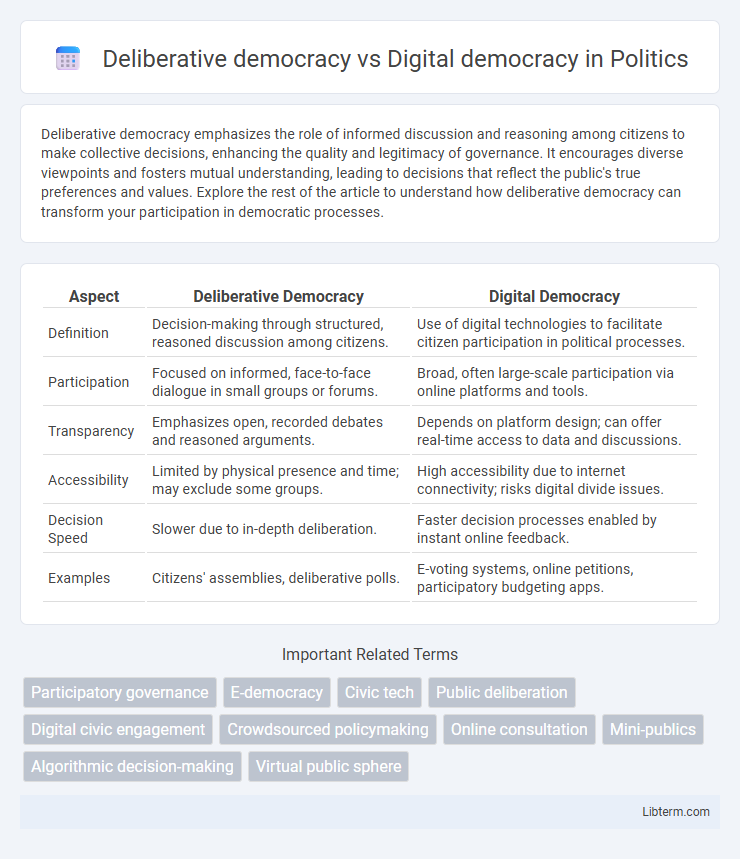Deliberative democracy emphasizes the role of informed discussion and reasoning among citizens to make collective decisions, enhancing the quality and legitimacy of governance. It encourages diverse viewpoints and fosters mutual understanding, leading to decisions that reflect the public's true preferences and values. Explore the rest of the article to understand how deliberative democracy can transform your participation in democratic processes.
Table of Comparison
| Aspect | Deliberative Democracy | Digital Democracy |
|---|---|---|
| Definition | Decision-making through structured, reasoned discussion among citizens. | Use of digital technologies to facilitate citizen participation in political processes. |
| Participation | Focused on informed, face-to-face dialogue in small groups or forums. | Broad, often large-scale participation via online platforms and tools. |
| Transparency | Emphasizes open, recorded debates and reasoned arguments. | Depends on platform design; can offer real-time access to data and discussions. |
| Accessibility | Limited by physical presence and time; may exclude some groups. | High accessibility due to internet connectivity; risks digital divide issues. |
| Decision Speed | Slower due to in-depth deliberation. | Faster decision processes enabled by instant online feedback. |
| Examples | Citizens' assemblies, deliberative polls. | E-voting systems, online petitions, participatory budgeting apps. |
Introduction to Deliberative Democracy
Deliberative democracy emphasizes reasoned discussion and informed decision-making through inclusive dialogue among citizens. It prioritizes consensus-building and the consideration of diverse perspectives to achieve legitimate and reflective public policies. This approach contrasts with digital democracy, which leverages online platforms to facilitate broader participation and quicker engagement.
Defining Digital Democracy
Digital democracy leverages internet technologies to enhance citizen participation in political decision-making, enabling real-time engagement and broader access to democratic processes. Unlike deliberative democracy, which emphasizes structured, face-to-face discussion and consensus-building among citizens, digital democracy focuses on inclusivity and immediacy through online platforms and digital tools. Key features of digital democracy include e-voting, online petitions, and digital town halls, which expand transparency and participation beyond traditional boundaries.
Core Principles: Deliberation vs. Digitalization
Deliberative democracy centers on informed, reflective discussion where citizens engage in reasoned debate to reach consensus, emphasizing the quality of deliberation and collective decision-making. Digital democracy leverages technology to enhance participation, utilizing digital platforms to facilitate voting, information sharing, and broader civic engagement, prioritizing accessibility and real-time interaction. While deliberative democracy values depth of discourse, digital democracy focuses on the scale and speed of citizen involvement.
Historical Evolution of Democratic Models
Deliberative democracy emerged in the late 20th century as a response to traditional representative systems, emphasizing reasoned discussion and public deliberation to enhance legitimacy and citizen participation. Digital democracy evolved alongside the rise of the internet and Web 2.0 technologies in the early 21st century, leveraging digital tools to increase accessibility, real-time engagement, and direct input from diverse populations. Both models reflect the ongoing historical progression of democratic practices adapting to social, technological, and political changes to expand inclusivity and responsiveness.
Citizen Participation in Both Systems
Deliberative democracy emphasizes informed and reflective citizen participation through structured dialogue and consensus-building processes, ensuring diverse viewpoints are considered before decision-making. Digital democracy leverages online platforms and tools to broaden access and facilitate real-time participation, enabling larger and more inclusive citizen engagement. Both systems aim to enhance democratic legitimacy but differ in mechanisms for fostering meaningful involvement and deliberation among the public.
The Role of Technology in Democratic Processes
Deliberative democracy emphasizes structured, reasoned discussion among citizens to reach collective decisions, often facilitated by technology that supports moderated forums and access to balanced information. Digital democracy expands participation through online platforms, social media, and e-voting systems, enabling broader, real-time engagement but facing challenges like misinformation and unequal access. The integration of AI tools and blockchain technology in democratic processes aims to enhance transparency, accountability, and inclusivity, transforming how citizens interact with governance in both models.
Strengths of Deliberative Democracy
Deliberative democracy excels in fostering thoughtful, reasoned debate among citizens, leading to more informed and reflective decision-making. Its emphasis on face-to-face dialogue enhances mutual understanding and consensus-building, reducing polarization and promoting social cohesion. This model prioritizes quality over speed, ensuring that public policies are shaped through careful consideration and diverse perspectives.
Challenges and Limitations of Digital Democracy
Digital democracy faces significant challenges including digital divide, cybersecurity threats, and misinformation, which hinder equitable participation and trust in online platforms. The lack of face-to-face deliberation limits nuanced discussions and deep engagement, reducing the quality of decision-making compared to deliberative democracy. Privacy concerns and algorithmic biases further complicate the digital democratic process, impacting transparency and inclusivity.
Integrating Deliberative and Digital Approaches
Integrating deliberative democracy with digital democracy enhances public engagement by combining structured, face-to-face discussions with scalable online platforms that foster inclusivity and real-time feedback. Digital tools enable wider participation and data analytics to inform deliberative processes, while deliberative methods contribute depth and quality to digital debates, ensuring informed decision-making. This integration supports more transparent, accountable governance by merging the strengths of both approaches in policymaking and civic involvement.
Future Prospects for Democratic Innovation
Deliberative democracy enhances future democratic innovation by emphasizing informed citizen dialogue and consensus-building, fostering more reflective policy decisions and strengthening civic engagement. Digital democracy leverages technology to expand participation, real-time feedback, and transparency, enabling scalable and inclusive decision-making processes. Combining deliberative methods with digital platforms promises to transform democratic institutions, creating hybrid models that maximize both thoughtful deliberation and broad accessibility.
Deliberative democracy Infographic

 libterm.com
libterm.com